Ford Puma vs Nissan Qashqai – erot ja hinnat vertailussa
Vertaa tehoa (168 hv vs 205 hv), tavaratilaa ja hintaa (30100 € vs 36000 € ) yhdellä silmäyksellä. Kumpi auto on sinulle parempi valinta, Ford Puma vai Nissan Qashqai?
Kustannukset ja kulutus
Hinta ja kulutus ovat tärkeimpiä ostopäätökseen vaikuttavia tekijöitä – ja juuri täällä erot usein korostuvat.
Ford Puma on hinnassa pienessä määrin edullisempi – sen lähtöhinta on 30100 € , kun taas Nissan Qashqai maksaa 36000 € . Ero on noin 5877 €.
Myös polttoaineenkulutuksessa näkyy ero: Nissan Qashqai kuluttaa 4.50 L ja on siten selvästi havaittava taloudellisempi kuin Ford Puma, jonka kulutus on 5.40 L. Ero on noin 0.90 L /100 km.
Moottori ja suorituskyky
Teho, vääntömomentti ja kiihtyvyys ovat autoharrastajien klassisia mittareita – ja erot tulevat tässä hyvin esiin.
Moottoritehossa Nissan Qashqai on vähän etulyöntiasemassa – 205 hv verrattuna 168 hv:een. Ero on noin 37 hv hv.
Kiihdytyksessä 0–100 km/h Ford Puma on melkein huomaamaton nopeampi – se saavuttaa 100 km/h ajassa 7.40 s, kun taas Nissan Qashqai tarvitsee 7.60 s. Ero on noin 0.20 s sekuntia.
Huippunopeudessa Ford Puma on tuskin havaittava edellä – se yltää 210 km/h:een, kun taas Nissan Qashqai saavuttaa 206 km/h. Ero on noin 4 km/h.
Myös vääntömomentissa näkyy ero: Nissan Qashqai vetää jonkin verran voimakkaammin, 330 Nm verrattuna 290 Nm:een. Eroa on noin 40 Nm.
Tila ja käytännöllisyys
Perheauto vai arjen kumppani – kumpi tarjoaa enemmän tilaa, mukavuutta ja käytettävyyttä?
Molemmissa autoissa on tilaa 5 henkilölle.
Omapainossa Ford Puma on kevyt kevyempi – 1316 kg verrattuna 1420 kg:een. Painoero on noin 104 kg.
Tavaratilan koossa Ford Puma tarjoaa tuskin havaittava enemmän – 523 L verrattuna 504 L:een. Ero on noin 19 L.
Maksimikantavuudessa Nissan Qashqai pärjää pienessä määrin paremmin – jopa 1447 L, noin 164 L enemmän kuin Ford Puma.
Kantavuudessa Nissan Qashqai on vähäinen parempi – 520 kg verrattuna 469 kg:een. Ero on noin 51 kg.
Kuka voittaa datavertailun?
Nissan Qashqai hieman parempi objektiivisessa datavertailussa.
Tämä arvio kertoo vain, kumpi malli kerää enemmän pisteitä paperilla – ei kumpi näistä kahdesta autosta tuntuu sinulle oikealta.
Kustannukset ja kulutus
Näytä yksityiskohtainen analyysi
Moottori ja suorituskyky
Näytä yksityiskohtainen analyysi
Mitat ja kori
Näytä yksityiskohtainen analyysi

Nissan Qashqai
Ford Puma
Ford Puma on ketterä ja trendikäs pieni crossover, joka yhdistää persoonallisen muodon ja arkikäytössä toimivan fiksuuden. Ajettavuus on yllättävän eläväistä ja sisustus ovelan käytännöllinen — erinomainen valinta ostajalle, joka haluaa arkeen ripauksen hauskuutta ilman turhaa pröystäilyä.
Tiedot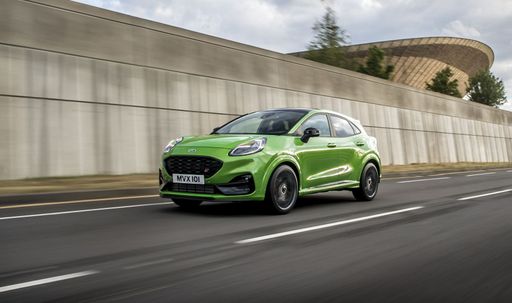
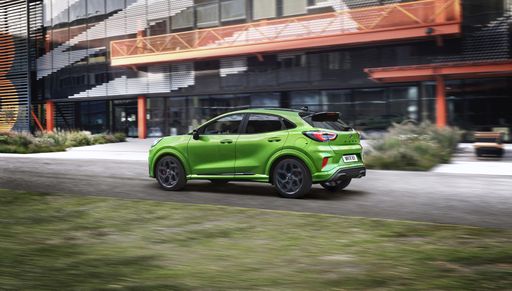
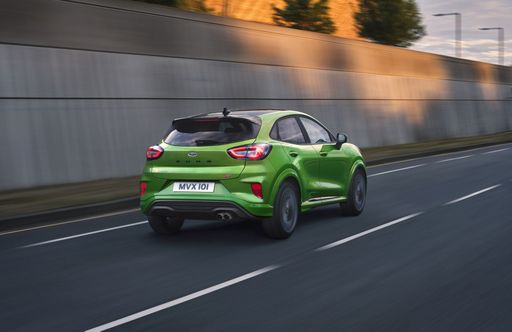
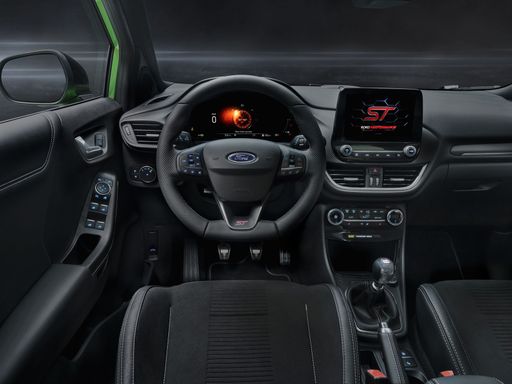
Nissan Qashqai
Qashqai on urbaani crossover, joka yhdistää sujuvan ajettavuuden ja arjen käytännöllisyyden tyylikkääksi ja luotettavaksi paketiksi. Se on fiksu valinta ostajalle, joka haluaa mukavan ja helppokäyttöisen auton kaupungin sykkeeseen ja viikonloppureissuille — ei se ehkä hurmaa katsojia ensimmäisellä vilkaisulla, mutta pitää hymyn huulilla ja arjen sujuvana.
Tiedot

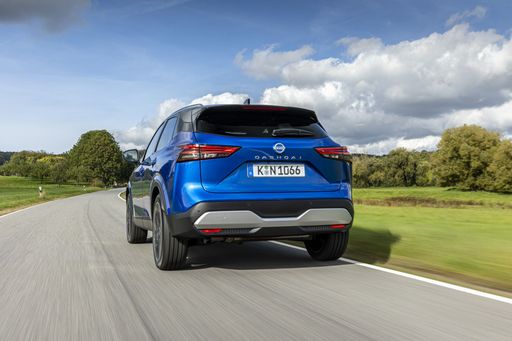


Kustannukset ja kulutus |
|
|---|---|
|
Hinta
30100 - 44200 €
|
Hinta
36000 - 48500 €
|
|
Kulutus L/100km
5.4 - 5.9 L
|
Kulutus L/100km
4.5 - 6.8 L
|
|
Kulutus kWh/100km
13.1 - 13.9 kWh
|
Kulutus kWh/100km
-
|
|
Sähköinen toimintasäde
361 - 376 km
|
Sähköinen toimintasäde
-
|
|
Akun kapasiteetti
43 kWh
|
Akun kapasiteetti
-
|
|
CO2
0 - 135 g/km
|
CO2
102 - 154 g/km
|
|
Polttoainesäiliön tilavuus
42 L
|
Polttoainesäiliön tilavuus
55 L
|
Mitat ja kori |
|
|---|---|
|
Kori
SUV
|
Kori
SUV
|
|
Istuimet
5
|
Istuimet
5
|
|
Ovet
5
|
Ovet
5
|
|
Omamassa
1316 - 1563 kg
|
Omamassa
1420 - 1665 kg
|
|
Tavaratila
456 - 523 L
|
Tavaratila
479 - 504 L
|
|
Pituus
4186 - 4226 mm
|
Pituus
4425 mm
|
|
Leveys
1805 mm
|
Leveys
1835 mm
|
|
Korkeus
1550 - 1555 mm
|
Korkeus
1625 mm
|
|
Maksimi tavaratila
1216 - 1283 L
|
Maksimi tavaratila
1422 - 1447 L
|
|
Kantavuus
367 - 469 kg
|
Kantavuus
466 - 520 kg
|
Moottori ja suorituskyky |
|
|---|---|
|
Moottorityyppi
Sähkö, Bensiini MHEV
|
Moottorityyppi
Bensiini MHEV, Täyshybridi
|
|
Vaihteisto
Automaatti, Manuel
|
Vaihteisto
Manuel, Automaatti
|
|
Vaihteiston lisätiedot
Alennusvaihteisto, Manuaalivaihteisto, Kaksoiskytkin automaatti
|
Vaihteiston lisätiedot
Manuaalivaihteisto, CVT-vaihteisto, Alennusvaihteisto
|
|
Vetotapa
Etuveto
|
Vetotapa
Etuveto, Neliveto
|
|
Teho hv
125 - 168 hv
|
Teho hv
140 - 205 hv
|
|
Kiihtyvyys 0-100 km/h
7.4 - 9.8 s
|
Kiihtyvyys 0-100 km/h
7.6 - 10.2 s
|
|
Huippunopeus
160 - 210 km/h
|
Huippunopeus
170 - 206 km/h
|
|
Vääntömomentti
170 - 290 Nm
|
Vääntömomentti
240 - 330 Nm
|
|
Sylinterien lukumäärä
3
|
Sylinterien lukumäärä
3 - 4
|
|
Teho kW
92 - 124 kW
|
Teho kW
103 - 151 kW
|
|
Iskutilavuus
999 cm3
|
Iskutilavuus
1332 - 1498 cm3
|
Yleistä |
|
|---|---|
|
Mallivuosi
2025
|
Mallivuosi
2025
|
|
CO2-tehokkuusluokka
A, D
|
CO2-tehokkuusluokka
E, C
|
|
Merkki
Ford
|
Merkki
Nissan
|
Onko Ford Puma saatavana eri vetotavoilla?
Mallia tarjotaan Etuveto-versiona.
